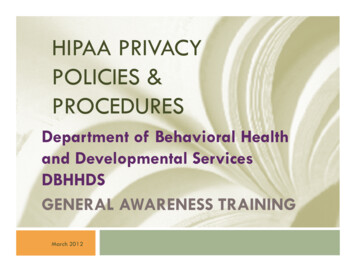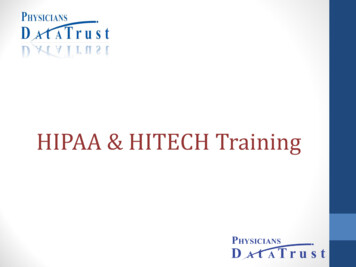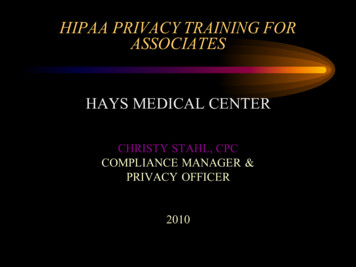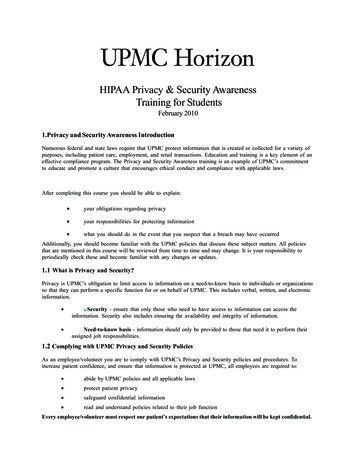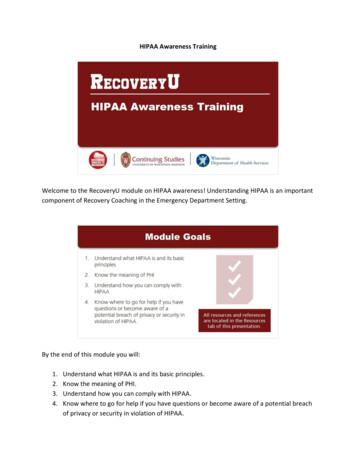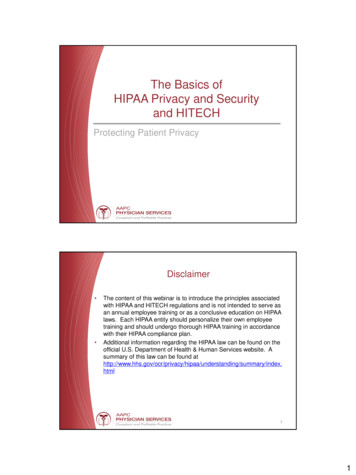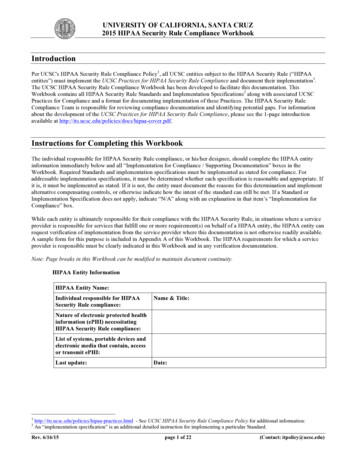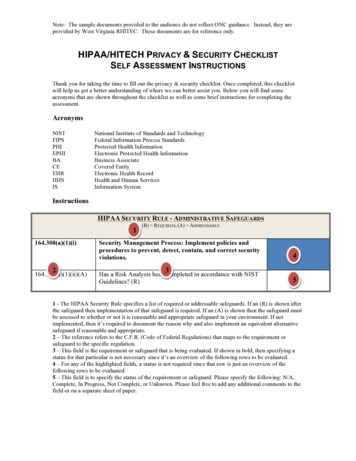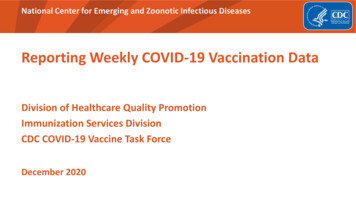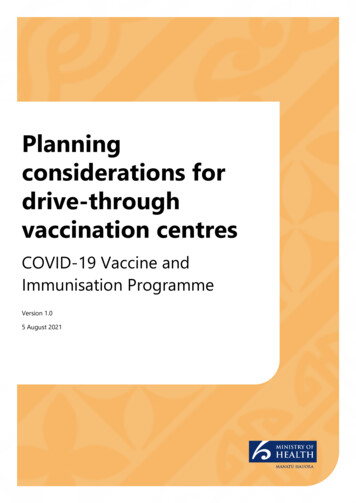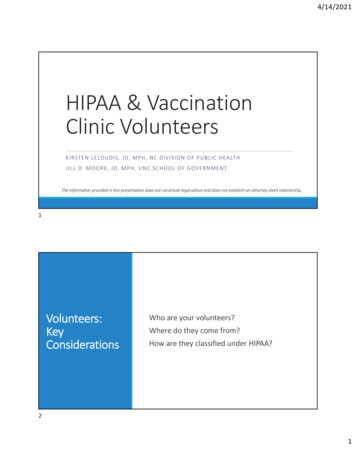
Transcription
4/14/2021HIPAA & VaccinationClinic VolunteersKIRSTEN L E LO U D I S , J D, M P H , N C D I V I S I O N O F P U B L I C HEALTHJ I L L D. M O O R E , J D, M P H , U N C S C H O O L O F G OV E R N MEN TThe information provided in this presentation does not constitute legal advice and does not establish an attorney‐client relationship.1Volunteers:KeyConsiderationsWho are your volunteers?Where do they come from?How are they classified under HIPAA?21
4/14/2021Who Are Your Volunteers?And Where Do They Come From?Clinical v. non‐clinical Non‐clinical staff Clinical: EO 116 temporarily waived NC licensurerequirements for health care personnel licensed inanother state, territory, or jurisdiction3How Are Your Volunteers ClassifiedUnder HIPAA?HIPAA WorkforceMemberBusinessAssociate (BA)Other Volunteers(Not workforce,not a BA)42
4/14/2021How Are Your Volunteers ClassifiedUnder HIPAA? (cont.)A member of the HIPAA “workforce” Can include: employees, volunteers,trainees, and others Performing work for a covered entity (CE)or business associate (BA) Their conduct in the performance of thatwork is under the direct control of theCE or BA Does not matter if they are paid or unpaid5How Are Your Volunteers ClassifiedUnder HIPAA? (cont.)A “business associate” Not part of your CE’s HIPAA workforce‐ butcould be part of another CE’s workforce Can be an individual or an entity Must perform certain functions or serviceson behalf of a CE that involve use/disclosureof protected health information (PHI) or areotherwise regulated by HIPAA E.g., data analysis, billing, IT, legal services Must have an agreement in placememorializing BA relationship63
4/14/2021How Are Your Volunteers ClassifiedUnder HIPAA? (cont.)Other types of volunteers Not part of your HIPAA workforcebecause they aren’t under thedirect control of your CE or yourBA when they’re performing theirvolunteer work7Volunteers:HIPAA andOther CommonIssuesTrainingConfidentiality agreementsBreaches and sanctionsBusiness associate agreements84
4/14/2021Training: What Does HIPAA Require?HIPAA WorkforceMemberTraining required underHIPAABusiness AssociateOther Volunteers(BA)(Not workforce, not a BA)Training not required underHIPAA(but may be a good idea)Training not required underHIPAA9The Pre‐Trained Volunteer Some volunteers may come to you with HIPAA training Could elect to accept documentation of recent HIPAA training Considerations: documentation, quality of the training, recentness These volunteers still need supplemental training on your CE’s policies and procedures information about volunteers’ assigned worksite or assigned roles105
4/14/2021Training for Business Associates HIPAA training not required But CEs can be BAs of other CEs‐ in which case, your BAmay have already required its workers to completetraining Even if not required, training may still be a goodidea Could include reference to training in yourbusiness associate agreement (BAA)11Training for Other Volunteers Not working under direct control of any covered entity orBA HIPAA training is not required Note: these volunteers should not be assigned roleswhere they are required or expected to hear, read, orotherwise access or encounter PHI Even if these volunteers complete your HIPAA trainingor someone else’s, that does not create a lawful basisfor them to access PHI (because they are not part ofyour CE’s workforce or your BA) May place limitations on what types of work thesevolunteers can do126
4/14/2021Overview of HIPAATraining RequirementsWho: Workforce members, including volunteersWhen: Within a reasonable period of time after joining the workforceWhat: Relevant aspects of – HIPAA Privacy Rule HIPAA Security Rule HIPAA Breach Notification RuleProof: Training must be documented, but the form of documentation isnot prescribed45 C.F.R. 164.530(b); 164.308(a)(5)13Volunteers must not share PHI about vaccination clinicpatients except as necessary to carry out the volunteerrolePaper and electronic records must be stored anddisposed of securelyVolunteerTrainingFundamentalsIf volunteer role includes access to electronic devices,volunteers must be trained in applicable securityprocedures, such as password protection, devicelockdown/shutdown, etc.Volunteers should know whom to contact if they havequestions or concerns about PHI managementVolunteers should not take personal photos orvideo/audio recordings of the clinicVolunteers who violate HIPAA policies/procedures mustbe sanctioned147
4/14/2021Privacy Rule: Key Points for VolunteersDefinition of protected health information (PHI) Individually identifiable information that pertains to health status or health care Includes information about vaccinationsSharing PHI within the clinic Volunteers and employees may share PHI with each other, but the sharing should belimited to the amount of PHI that is necessary to accomplish the purpose Volunteers should cooperate with the entity’s “reasonable safeguards”—steps takento guard against PHI being seen or heard by othersSharing PHI outside of the clinic Volunteers should not share PHI with anyone outside the clinic, unless it’s part oftheir volunteer role or they are directed by to do so by the entity operating the clinicSocial media and other social sharing Volunteers must not take photos or make audio or video recordings of a vaccinationclinic for their personal use Volunteers must not share information about vaccination clinic patients on socialmedia15Security Rule: Key Pointsfor VolunteersVolunteers must comply with policies and procedures forkeeping paper and electronic information secureDepending on the volunteer’s role, this may include training inmatters such as: Password management Protecting devices against malware Securing devices when not in use Management and disposal of papers containing PHIVolunteers must not access paper or electronic records exceptas required by their volunteer role168
4/14/2021Breach Notification Rule: KeyPoints for VolunteersDefinition of breach (simplified) A breach is a use or disclosure of PHI that is not allowed byHIPAAVolunteers’ duties if known or suspected breach: Notify the appropriate clinic personnel Cooperate with breach investigationSanctions Volunteers who cause a breach must be sanctioned inaccordance with the entity’s sanctions policies17How should you train volunteers?Options Brief written document plus oral instructions Use existing online training resources AHEC training developed specifically for COVID‐19 vaccinationclinics: ional‐development/event.cfm?eventid 65572 Use the HIPAA training that you use for your employeesInclude any information that is specific to your clinic,especially: Security policies/procedures for volunteers working withpaper or electronic PHI Local contact person for HIPAA questions/concerns Role‐specific information for your clinic189
4/14/2021Documentation of TrainingVolunteer training must be documentedDocumentation must be paper or electronicbut no particular form is required Common forms: certificates, logsAt a minimum, documentation should include: Name of person trained Date and time of training Title or brief description of trainingCovered entity should retain a copy of thetraining materials used19Confidentiality AgreementsHIPAA WorkforceMemberBusiness AssociateOther Volunteers(BA)(Not workforce, not a BA)Not required, but may be agood ideaNot required, but may be agood ideaNot required, but may be agood idea2010
4/14/2021Confidentiality Agreements (cont.)Not required under HIPAA, but helpful way to document volunteers’acknowledgement and acceptance of requirements related to their work Can be used for your workforce, your BAs, and other volunteers Other volunteers (non‐workforce, non‐BA) are not required to comply with HIPAA but aconfidentiality agreement may still help ensure protection of patient privacy A good place to remind volunteers of other laws that may apply For example, NCGS 130A‐143, North Carolina’s communicable disease confidentiality statute,applies to information about an individual who has or may have a reportable disease COVID‐19, a novel coronavirus, is reportable in North Carolina Vaccine eligibility screening questions may elicit information that is protected under this law21Confidentiality Agreements: CommonElementsName of covered entityStatements that the volunteer: Understands patient information is confidential and protected bystate and federal law Agrees to complete required training Understands and agrees to abide by covered entity’s policies andprocedures to protect privacy and security of patient information Will not take personal photos or recordings of vaccination clinic Will not share information about vaccination clinic patients on socialmedia Will promptly report known or suspected violations of privacy orsecurity policies and will cooperate with breach investigations Has read and understands the statementVolunteer’s name, signature, and date2211
4/14/2021HIPAA Breaches and SanctionsHIPAA WorkforceMemberCE can be liable for breachesits workforce causes; musthave sanctions policyBusiness AssociateOther Volunteers(BA)(Not workforce, not a BA)BA can be liable forbreaches, but also uses ofPHI not permitted under theBAA and not required by lawIdeally no breaches becauseshould not be accessing PHI23HIPAA Breaches and Sanctions (cont.)According to HIPAA, who can be held responsible for breaches? CE can be held responsible for breaches caused by its workforce This includes your volunteers that are part of your workforce! BAs can be held responsible for breaches caused by the BA and its workers, as well as usesof PHI that are not permitted by the business associate agreement (BAA) or required by law Ideally, your other volunteers will not cause breaches because they should not have accessto or be in possession of PHISanctions and other consequences Covered entities are required to have policies for sanctioning workforce members whoviolate HIPAA policies or procedures Business associate agreement (BAA) should also outline consequences for BAs that cause abreach of PHI Sanctions can vary to reflect the severity of the situation (e.g., verbal correction, re‐training,dismissal)2412
4/14/2021Business Associate Agreements (BAAs):What Does HIPAA Require?HIPAA WorkforceMemberNo BAA; by definition, CEcannot have a BA that is alsopart of the CE’s workforceBusiness AssociateOther Volunteers(BA)(Not workforce, not a BA)HIPAA requires a BAANo BAA (by definition, notyour business associate)25Business Associate Agreements (BAAs):When Does HIPAA Require One? (cont.)HIPAA requires documentation ofBA relationship Often called “business associateagreements” (BAAs) Must include certain elements setforth in the HIPAA Privacy Rule HHS provides an example BAA onits website2613
4/14/2021Questions?2714
HIPAA Training not required under HIPAA (but may be a good idea) Training not required under HIPAA The Pre‐Trained Volunteer Some volunteers may come to you with HIPAA training Could elect to accept documentation of recent HIPAA training Considerations: documentation, quality of the training, recentness
